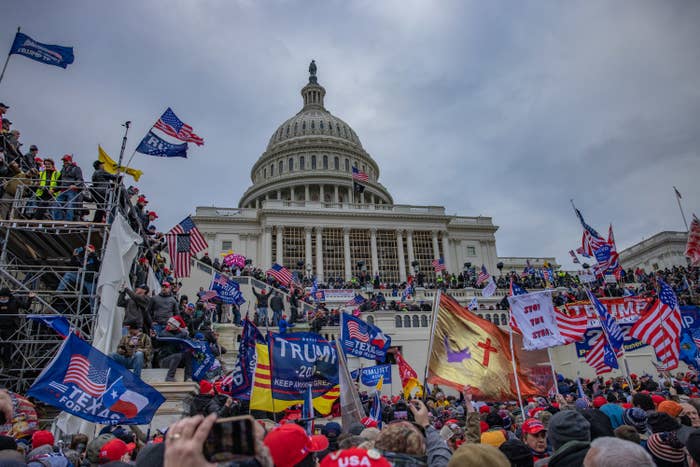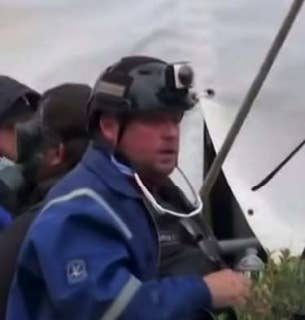
WASHINGTON — A string of Thanksgiving eve filings in the case of Guy Reffitt — a Texas man charged with bringing a handgun to the US Capitol during the Jan. 6 riot — offered an early glimpse into what a trial in the unprecedented prosecution effort will look like.
Reffitt’s Feb. 28 trial date is tentative, but his case is the farthest along in terms of preparation. It’s the first case where prosecutors and the defense submitted a list of proposed jury questions, along with pretrial motions about what testimony and evidence can go before jurors. The draft questionnaire sheds light on what both sides want to know about the people who could decide Reffitt’s fate — specifically, what prospective jurors know about Jan. 6, where they get their news, and whether their political beliefs could get in the way of being fair.
Reffitt, meanwhile, lodged an objection to the government using language to describe certain evidence that he contends is “opinion testimony,” such as “breach” and “confrontation.”
The political and cultural fault lines drawn around Jan. 6 have seeped into the courtroom over the past year, with some defendants claiming they’re political prisoners while others distance themselves from their previous support for former president Donald Trump. Any fights over what information and opinions jurors bring with them and what language lawyers use at trial will mirror fights that have played out for months in the public arena over how to describe what happened — An insurrection? A riot? Terrorism? A “tourist” visit? — and how the Justice Department and Congress have handled their respective investigations.
Trial dates are on the calendar in at least 17 cases related to the attack on the Capitol, including a multi-defendant conspiracy case against members of the Oath Keepers extremist group, according to BuzzFeed News’ review of court records. The latter half of the year was marked by a flurry of guilty pleas — nearly 150 defendants have taken a deal with the government so far — but developments in cases like Reffitt’s highlight the fact that other defendants have dug in for a fight.
Most defendants are being prosecuted individually instead of en masse. Whichever cases have reached a milestone first — from pretrial detention orders to plea hearings and sentencings — have provided a model for judges, prosecutors, and defense lawyers across these cases to build on, even if the case-specific facts and allegations are different. The same will be true of whichever cases are the first to go to trial.

Reffitt is charged with bringing a rifle and a semi-automatic handgun to Washington to support a civil disorder, carrying the latter firearm to the Capitol, and charging at police officers, who deployed projectiles and pepper spray to keep him back, according to the government. He’s facing a felony count for obstructing Congress’s certification of the election by joining the mob that descended on the Capitol complex. He’s also charged with threatening his children if they shared incriminating information with law enforcement.
Reffitt is one of several defendants challenging the government’s decision to pursue the obstruction count in connection with Jan. 6. Reffitt has argued that Congress’s activities in a joint session that day weren’t the type of “official proceeding” that the obstruction statute was meant to cover, and that language in the law about a person needing to act “corruptly” is unconstitutionally vague. Other defendants have pressed similar arguments. No judge has ruled on the issue yet. It’s the most common felony charged across the Capitol riot cases, and a loss for the government could dramatically change the scope of the prosecution effort.
US District Judge Dabney Friedrich heard the latest round of arguments in Reffitt’s case on Nov. 19, but in the meantime kept in place a schedule she’d already set for pretrial filings. If Reffitt wins dismissal of the obstruction count, he’ll still face multiple counts related to the firearms charges and the allegation that he interfered with the investigation by threatening his children against cooperating.
Several jury questions proposed by the government reflect the massive amount of media coverage of Jan. 6 and the hundreds of arrests that followed. Knowing something about a case doesn’t automatically disqualify a person from serving on a jury, but the lawyers will probe what potential jurors know, where they got that information from, and how much it could color their thinking about Reffitt and the allegations against him, either in his favor or against it.
A few of these questions, which Reffitt did not object to, explore if jurors know anyone with a “direct or indirect connection” to Jan. 6 or have such a connection themselves, and attempt to quantify just how much information about the riot a prospective juror has consumed.
One question reads: “Have you ever watched video of what happened at the U.S. Capitol on January 6, 2021 on the news or on the Internet? If yes, how many times have you seen videos of that event, in whole or in part, on TV or on the internet? (1 time, 2-3 times, 4-5 times, 6 or more times).”
Another question proposed by the government uses the same numerical format to ask how much a potential juror has heard specifically about Reffitt and his case. Prosecutors also want to ask specific questions about where jurors get their news from, as well as, “In what ways, if any, could your political views, or those of your spouse, affect your service as a juror in this case?”
Prosecutors and Reffitt’s lawyer William Welch III offered two versions of a question about whether jurors who were already familiar with what happened on Jan. 6 could still be fair.
The government wants to ask: “No matter what you have heard or seen about events at the U.S. Capitol on January 6, 2021, and no matter what opinions you may have formed, can you put all of that aside and decide this case only on the evidence you receive in court, follow the law, and decide the case in a fair and impartial manner?”
Welch pitched an alternative: “Does anyone have such strong feelings about events at the Capitol on January 6, 2021 that would make it difficult to be a fair juror in this case?”
Friedrich also gave both sides until Nov. 24 to file motions related to trial evidence, and Reffitt filed one challenging the captions that prosecutors used in a set of Capitol surveillance videos. Welch wrote that they didn’t object to including the time and location of a recording, but argued that descriptions such as “Rioters Approach,” “Breach,” “Confrontation,” and “Police Line” were hearsay and amounted to “opinion testimony.”
Last month, prosecutors filed two motions related to trial evidence. The first asked for the judge’s permission to allow an FBI special agent to testify about a gun holster found in Reffitt’s home and compare it to a photo of Reffitt from the Capitol that prosecutors say show him with that holster attached to his hip. That filing was the first time the government publicly shared what it said was photo evidence of the handgun.
The government also asked to limit the types of questions that Reffitt’s lawyer could ask of a US Secret Service witness who prosecutors planned to call to testify about how the riot affected their protection of former vice president Mike Pence and his family. Prosecutors don’t want the defense to ask for details about how agents protected Pence and his family or generally about Secret Service protocols in emergency situations.
Friedrich is set to take up the trial evidence issues at a pretrial hearing on Jan. 6, 2022 — the one-year anniversary of the riot.
